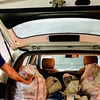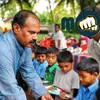From food to hygiene kits, this NGO is helping the underprivileged during COVID-19
Founded in 2016, Samarpan is an NGO that is helping the needy and the underprivileged. During the coronavirus pandemic, the organisation has been very proactive in helping people who have lost their livelihoods.
The coronavirus pandemic and the subsequent lockdown has affected us in many ways, but it has affected the poor and the marginalised sections of the society the most. It has resulted in an economic crisis, resulting in loss of livelihoods of daily wage workers and migrant labourers.
During this crisis, NGOs from across the country have come forward to help these vulnerable groups by providing food and other essential items.

Ruma Bhargava (right) Megha Bhargava (centre), and Suresh Kataria (left) with the kids of Children Aid Society, Mumbai
One such organisation is Mumbai-based Samarpan, founded in 2016 by Ruma Bhargava, a doctor-turned-public-health-professional, currently working with the International Red Cross Society. She started the NGO with the support of her sister, Megha Bhargava, Deputy Income Tax Commissioner in Mumbai, and many other doctors and civil servants.
During the pandemic, the organisation has distributed over 18 lakh meals to the underprivileged in different parts of Maharashtra, Karnataka, Delhi, Rajasthan, and Madhya Pradesh. Apart from this, it has also given more than 28,000 ration kits and other essentials items including masks, gloves, sanitisers, as well as sanitary napkins. The organisation is also helping women SHGs find a livelihood in these trying times.
At present, Samarpan is helping underprivileged children with healthcare and education, and claims to have impacted more than 10,000 lives in the states of Uttarakhand, Maharashtra, and Rajasthan.
COVID-19 relief work
As the coronavirus cases began to soar in India, Ruma, with her experience in the development sector, got along with the Samarpan team and designed a strategy to reach out to the migrant and daily wage workers impacted by the lockdown.
Within two days, they gave 800 bottles of hand sanitisers to Mumbai Police and 1,300 bottles to Gujarat Police to help them stay safe in their line of duty. The team also distributed 2,500 masks to healthcare workers, security guards, house maids, and vegetable vendors and those providing essential services.

Ration kits provided to an orphanage in Mumbai
With the help of Suresh Kataria, an IRS officer based in Mumbai, the organisation also distributed rations to the poor families whose livelihoods were severely affected by the pandemic. So far, the NGO claims to have distributed more than 28,700 ration kits.
“Each of these kits comprised of flour, rice, pulses, oil, sugar, vegetables, and spices, and were distributed to migrant workers and daily wagers,” says Megha.
“Around 5.57 lakh cooked meals were also provided to the homeless and those who did not have access to their own kitchens till the lockdown periods were happening,” she adds.
In addition to this, about 56,470 hand sanitisers, 1,57,000 face masks, 57,000 soaps, and 3,500 pairs of gloves were provided to the police personnel, sanitation workers, essential service providers, and migrant workers to maintain personal hygiene and prevent the spread of infection.

Sanitary napkins were distributed to 25,000 women in the slums
“Because of the lockdown and lack of income, the underprivileged women found it extremely difficult to maintain menstrual hygiene. We distributed sanitary napkins to 25,000 such women in slums and containment areas like Dharavi, Kamathipura, Sion, Koli-wada, Worli slum, Andheri West, Govandi slums, and Nagpada in Mumbai, and government hospitals, ensuring them a safe period,” says Megha.
According to the organisation, it also helped migrant workers travelling back to their villages via Shramik trains by providing them with sanitary kits comprising of sanitisers, face mask, and soaps. Besides this, 35,700 packets of milk powder, 2,00,000 nutrition bars, and 5,612 kgs of fruits and vegetables were distributed to ensure a nutritious diet to them.
Serving the poor
Since its inception, Samarpan, which has adopted around 41 schools in the states of Uttarakhand, Maharashtra, and Rajasthan, has been providing students with education supplies every year, including two sets of uniforms, a sweater, a school bag with all the necessary stationery supplies, and a new pair of shoes.
As drinking water has been a major issue in rural schools, Samarpan has also helped with water sanitation.

Samarpan primarily works in the education and healthcare sectors
Megha says, clean drinking water is of utmost importance, especially when it comes to schools. “We have installed water purifiers across schools, which is indirectly bringing down the number of absentees in schools due to water-borne diseases,” she tells SocialStory.
After realising girl students in government schools and colleges had to travel many kilometres to buy a pack of sanitary napkins, the organisation decided to distribute biodegradable sanitary napkins to them, thus reducing environmental footprint.
Despite the advancements in technology, constant electricity supply is still a dream in many villages in India. So, in addition to education and healthcare, the team has also distributed a solar lamp to each of the families that can provide light for up to 18 hours.
Upcoming plans
In the current scenario, it is extremely important to support the livelihood of those who lost their source of income during these testing times.
Hence, Samarpan has come up with a project called ‘Rebuilding Lives’, and is reaching out to women Self Help Groups (SHGs) to augment their sources of income and support their families.
To help rural women with menstrual hygiene, it has now tied up with the Nightingale Federation, a SHG comprising of 10 women, which is running a Reuseable Sanitary Napkin Production Unit in Changlang district of Arunachal Pradesh. The NGO is buying sanitary napkins from the federation and distributing it to the rural women.

Reusable pads made by the Nightingale Federation in the Changlang, to soon be in circulation
“Samarpan has undertaken capacity augmentation of the unit by providing the machinery and raw materials for the production of sanitary napkins,” says Megha. “This will help in enhancing the production, leading to increased revenue generation for the women and bringing back livelihood security to these families in remote parts of India,” she adds.
In this regard, Samarpan will also be working in collaboration with the District Administration of Changlang for efficient and accountable use of funds as well as ensuring a market for the product.
“Mahila Bachat Gat is another SHG of eight women in Mumbai, which is involved in tailoring activity. Samarpan is purchasing face masks from this group and will be distributing the same to the essential service providers and the people in need,” she says.
Edited by Megha Reddy








